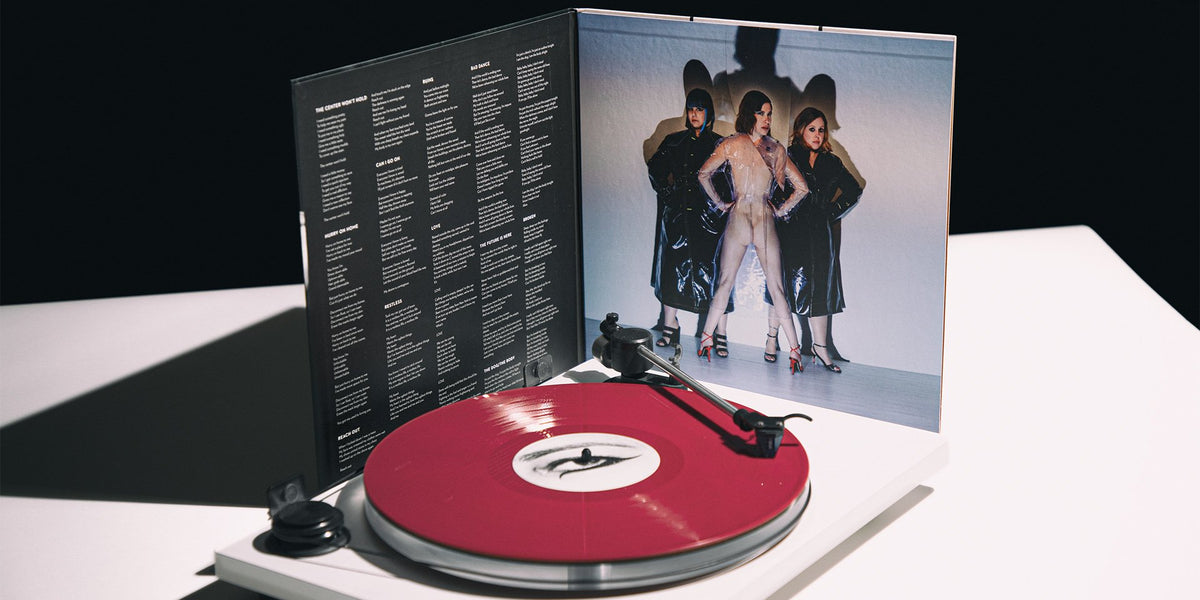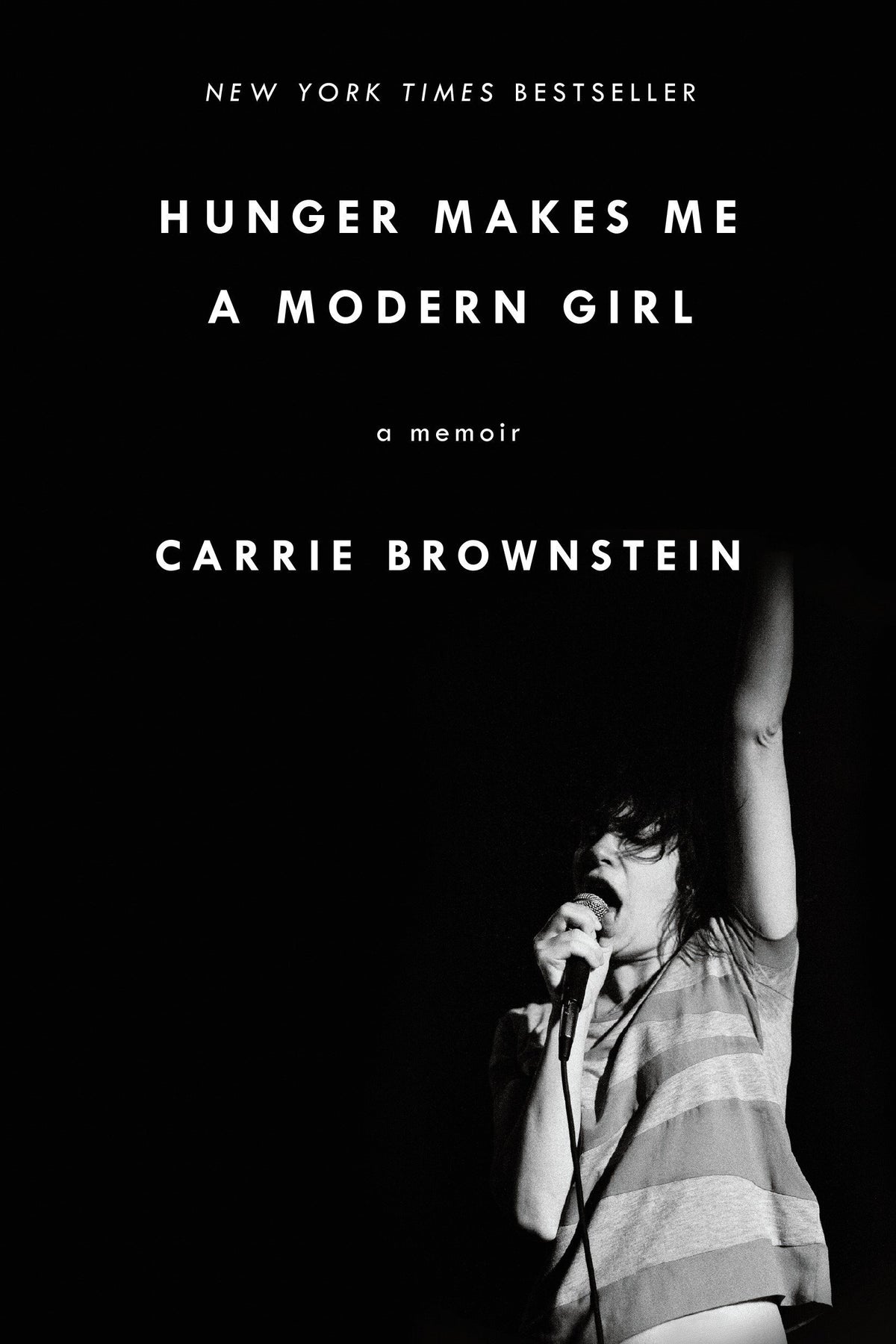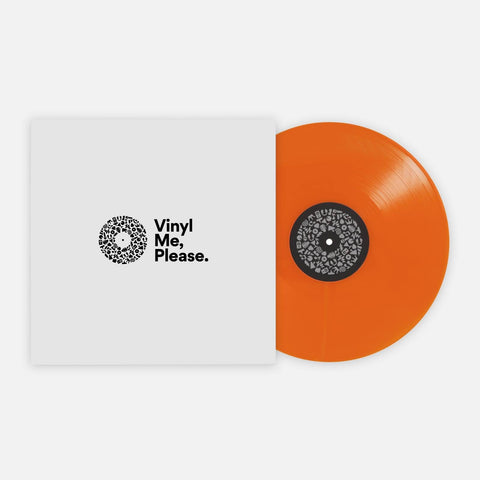My Desire Is Contagious: Sleater-Kinney On Creating 'The Center Won't Hold'
We Talk To The Band About Their 9th Studio LP, Our Record Of The Month
On a drizzly April evening in New York's Chelsea, Corin Tucker, Carrie Brownstein, and Janet Weiss pack onto a stylish couch in the windowless bowels of a creative agency. Slumped a bit after a long day of shooting the cover of Sleater-Kinney’s ninth studio album, The Center Won’t Hold, they engage in a brief discussion about an unidentified object in the corner of the room made up of a large barrel, approximately 10 brooms, and a plastic children’s urinal (Is it art? The consensus is yes). My request to know what we can expect from the album art is met with three smirks, followed by the type of silent eye contact conversation that seldom occurs outside of people who have known each other for decades.
Corin jumps in, “We definitely were trying to take risks and be adventurous with it,” she trails off in a withholding way that leads me to infer I’ll have no idea what I’m in for until I see the album art. Still, I gasp when I see the cover art for the first single, “Hurry On Home,” over a month later. When three women in their 40s and 50s make a rock album, you don’t expect to see a bare ass on the single art. But then again, you definitely don’t expect it to sound like The Center Won’t Hold.
“There's a lot of assumptions about what three women, when they get to a certain age, what they sound like, you know?” even visibly exhausted, Carrie punctuates the majority of her sentences with a massive grin. “The sound of this record is a sound that I'm pretty sure no women our age have made before ... It's hard to even expect a 10th album from any band, let alone an all-female band that writes their own songs. So, I think just in that literal way, we're excited to fill up the landscape and hope that people follow.”
The art for “Hurry On Home” packs even more of a punch when you consider the moment on “Love” when Carrie sneers out, “There’s nothing more threatening and nothing more obscene than a well-worn body demanding to be seen. Fuck!” “Love” is an effusive love letter to Sleater-Kinney, scrawled with brazen words across a major key. The only obvious nostalgia to speak of on the entire album is the song’s recounting of when Carrie first slipped Corin her address and the band’s days of sleeping in a tour van as they traversed across the country, but it’s all followed up by the line, “Done with being told that this should be the end.”
Although there’s greater pressure for women to adhere to it, the model for iconic artists of any gender cashing in on reunion tours and feel-good reminiscence is a tale as old as time. And the seductive allure of leaning into nostalgia is glaring. A majority of the limited social media criticism over the album’s singles share both an implication that Sleater-Kinney is a fixed ideal and a mourning over the loss of that ideal. “It's not bad but it is not the Sleater-Kinney I know,” one Reddit user wrote in response to a thread discussing the new music. The sentiments grew louder when Janet Weiss announced her departure from the band a couple months after we spoke, despite there being The Center Won’t Hold, to which she wholly contributed her talents. For any band that’s achieved the heights of Sleater-Kinney, stasis is often rewarded — and change often grieved.
“The role of a woman onstage is often indistinct from her role offstage — pleasing, appeasing, striking some balance between larger-than-life and iconic with approachable, likable and down-to-earth, the fans like gaping mouths, hungry for more,” Carrie wrote in her 2015 memoir Hunger Makes Me A Modern Girl.
Luckily, every move Sleater-Kinney’s made over the past 25 years signifies that they’re hellbent on artistic evolution over feeding the gaping mouths more of the same. If anything, a fear of getting pinholed into expectations only made the band’s desire to innovate burn hotter. After the writing process, they enlisted their friend Annie Clark (St. Vincent) to aid in what would become her first full-length production credit. Their original idea was to work with a number of different producers, but after the first session with Annie, “doors unlocked, and she just blew us away,” Corin says. With Annie finishing up her tour for Masseduction, they feared the collaboration would be a pipe dream, but as soon as her touring died down, Annie threw herself into the project and produced the entire thing.
“I think we all have that idea that we wanna prove to people what we're capable of. I think that's run through our career,” Janet said in April. “We wanna one-up ourselves from the last album. We wanna prove that we can write a certain kind of record when people think that we can only be — you know, people put us in a box and think we can only do this one sort of thing. And I think Annie came with that in spades.”
Be it through collaborators, the band itself, or fans, fresh energy seems to orbit around Sleater-Kinney. After the band’s return in 2015 from a near-decade hiatus with their last album, No Cities To Love, they noticed a new generation of younger fans appearing at their shows. It makes sense: No band does a boiling, rapturous tantrum of feminist punk rage quite like Sleater-Kinney, and this generation of feminist punks certainly doesn’t have any less to scream about than they did 1995. So long as Sleater-Kinney is adapting to the sound and reality of 2019 — and they are — who better to scream along to?
“We're living in a time where certain infrastructures upon which we relied have been exposed as inadequate or malfunctioning, dysfunctioning, or just exposed as probably always being flawed, but now we sort of take stock of those flaws,” Carrie said. Just as our infrastructures have been undergoing a rapid mainstream cultural and political auditing, so too would their music. “It was just a literal and figurative shift ... We embraced all the things that used to be an absence. We sort of dove into that absence, and played around in it, and came up with something different.”
They’d also never written an album together from geographically different locations before The Center Won’t Hold, a circumstance that Carrie says transformed “the entire palette of the record.” Before, they’d almost always written on guitar together in the same room, but they estimate that only about a third of the songs on The Center Won’t Hold were written on guitar. With Carrie in Los Angeles and Corin in Portland for the bulk of the writing process, one member would often record multiple versions with multiple instruments on Logic or GarageBand and send it to the other, who would add to it, refine it, and send it back. Carrie retrospectively calls the distance “a blessing” and said it transformed the writing process into “a really vast playground,” especially in comparison to what they were used to. The result is a sound that, while more hushed and less frantic, takes up more space than any other Sleater-Kinney record before it.
The Center Won’t Hold manages to balance a grimey unease and a polished glisten all at once — a quality that clicks when the band tells me they were listening to a lot of Depeche Mode when they wrote and recorded it. The title track, and introduction to the album, could serve as a catwalk for flexing their newfound sonic landscape. A song fit to soundtrack a glamorous and seedy cinematic heist, it oozes around a subdued terrain of alien percussion until three-fourths of the way in, when it explodes into a signature fit of high-speed shredding that no one does quite like Sleater-Kinney.
“Carrie was talking about using different tools, but also making those as huge as we could make them. Not only do we express our feelings, but we express our emotions in a really large, sonic sense,” Corin explains. “Center Won't Hold” [is] a giant-sounding song, and I was literally in the studio, like, playing timpani, every single instrument that we could possibly put on that song. We wanted it to sound huge and kind of startling.”
What marks the biggest departure from their sound, and packs the biggest emotional blow, isn’t the song with the most instruments or bone-rattling guitars. It’s a piano ballad as simple as they come: the album’s closer, “Broken.” Carrie remembers listening to Rihanna ballads “Stay” and “Love on the Brain,” playing them for Corin in admiration of their raw quality. Inspired, she wrote the breathtaking piano part that ended up being the instrumental base for “Broken” and asked Corin to sing over it. The stark instrumental softness paved the way for Tucker’s gutting vocal performance that conjures up Christine Blasey Ford and the #MeToo movement, and manages to bottle the shared visceral reaction among women and survivors of every age across the country. “I really can’t fall apart right now, but it hits me too close to the bone,” she sings. “I thought I was all grown up right now, but I feel like I’ll never be done.”
But for an album that digs into mental turmoil, corrosion, loneliness, depression, The Center Won’t Hold is, all and all, a fucking blast. I’m not sure anyone could’ve predicted that a Trump-era Sleater-Kinney album would be the kind of album for smile-screaming along in a stadium or out your car window. But when I found myself alone in my underwear one evening before the interview belting the lightly suicidal chorus of “Can I Go On” (“Maybe I’m not sure I wanna go on, wanna go on!”) euphorically into a Swiffer WetJet, I knew it was truly a work for the times.
There’s high energy and contagious melody and Annie Clark’s playful, glimmering production, but there’s also the irreplicable, infectious quality of four women cathartically making art together. You can hear it on every song. As “Can I Go On” transitions into the bridge, you hear Corin sultrily pout, “Too sticky!” The whole band laughs when I ask them about it, and say it was never intended to be a part of the song. They said Annie had the idea of just getting the three of them to laugh and tell jokes and have a conversation around a microphone in the studio, and Corin’s “too sticky” fit perfectly into the transition.
“I think it is a nice weird moment of levity and oddity in a song that is, yeah, lyrically grim,” Carrie says, followed by more laughter from the band. “But I think it plays in with the next lyrics, which is, ‘My desire is contagious,’ which to me has one of the most troubling dual meanings. Because it's desire, like female desire, it's sort of singing about that. But to me it's also about the desire to die and how that is contagious. So I feel like the ‘too sticky’ kind of weirdly works into that.”
A “nice weird moment of levity” is also precisely how the band portrays their experience making The Center Won’t Hold as a whole. Corin said it was the first time she felt empowered and excited “maybe in months.” While they’d had a long day, it remained a constant through our conversation that the band members would light up simply remembering recording the album. It resembled the same light that was fueling The Center Won't Hold.
“I feel like that is the internal juxtaposition — fighting the dark urges, and often, moments that are the most bleak are often tinged with humor or joy.” Carrie said. “I think we wanted the music to have a buoyancy, over and over again, and I think we worked a lot on melody, but the places from which we were writing were bleak. And I think the music was the thing that was kind of saving us. So, we were expressing these dark corners and then just raising them up to a level that was joyous, in hopes that that would be the remnant...It was nice to kind of take something that had stemmed from despair, despondency, and to give it something that sort of gleamed and glimmered a little bit.”
Amileah Sutliff is a New York-based writer, editor and creative producer and an editor of the book The Best Record Stores in the United States.
Related Articles
Join the Club!
Join Now, Starting at $36Pages







